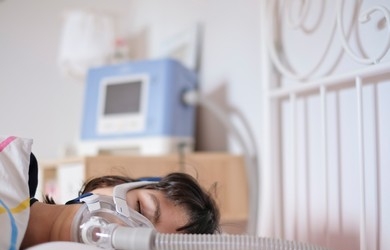BIPAP (Bilevel Positive Airway Pressure) and (CPAP) Continuous Positive Airway Pressure devices are used to treat sleep apnea, a condition in which a person’s breathing repeatedly stops and starts during sleep. These machines use a mask connected to a machine to deliver air pressure to the airway to keep it open, allowing the person to breathe normally while they sleep. BIPAP provides two levels of air pressure, one for inhalation and one for exhalation, while CPAP provides a single level of air pressure. Both devices are commonly used to manage sleep apnea, improve breathing and reduce snoring, allowing for a better night’s sleep.
before you go further to buy/rent these devices, get all the relevant information and consider the following factors to get the best CPAP/BiPAP machines for your needs.
1. Supportive Pressure Requirements Setting
CPAP and BiPAP machine comes with different pressure settings. In a CPAP machine, the pressure is set to a single, constant level that is designed to keep the airway open at all times during sleep. This level is determined by a sleep specialist or respiratory therapist and is usually set between 4 and 20 cm H2O. The pressure setting remains the same throughout the night, regardless of the patient’s breathing patterns or sleep stages.
On the other hand, a BiPAP machine has two pressure settings: the inspiratory positive airway pressure (IPAP) and the expiratory positive airway pressure (EPAP). The IPAP is the pressure delivered during inhalation and is set higher to help keep the airway open, while the EPAP is the pressure delivered during exhalation and is set lower to make it easier to exhale. This two-level pressure system adjusts dynamically throughout the night to accommodate the patient’s changing needs.
BiPAP machines are typically used for patients with more complex forms of sleep apnea or other breathing disorders, such as central sleep apnea, Cheyne-Stokes breathing, or complex sleep-related breathing disorders. These patients may need higher pressure support during inhalation and lower pressure support during exhalation to accommodate their breathing patterns
2. Rental Price
The rental price of a CPAP machine varies depending on several factors such as the brand, features, rental period, location, and type of the device. On average, a basic CPAP machine on rent can cost anywhere from ₹3000 to ₹5000. However, the cost can go up to ₹10000 or more for high-end models with advanced features like heated humidifiers and integrated wireless connectivity.
A BiPAP machine is typically more expensive than a CPAP machine, with an average cost ranging from ₹4500 to ₹8000. Similar to CPAP machines, the price of a BiPAP machine on rent varies depending on different factors. Advanced and High-end machines with special features like auto-adjusting pressure and data tracking can cost up to ₹13000 or more.
It’s important to note that rental prices for CPAP and BiPAP machines can also vary based on the company you rent from and the services they offer. Some companies offer packages that include the machine, mask, filters, and other accessories, while others may only provide the machine itself. It’s important to compare prices and services from multiple companies to find the best deal and to choose a reputable company with quality equipment.
3. Humidification and Heated tube
Humidification is a crucial aspect of using these machines, as it helps to prevent drying of the airways, reducing discomfort and irritation during treatment. By adding moisture to the air delivered through the CPAP or BiPAP mask, humidification can help to reduce symptoms such as dry mouth, nose, and throat.
Heated tubes are designed to prevent condensation and a rainout of water vapor, providing a more comfortable breathing experience. This is particularly important for people who use a CPAP or BiPAP machine for extended periods of time, as it can make a big difference in terms of comfort and adherence to treatment. CPAP and BiPAP machines can be fitted with heated tubes and built-in humidifiers, or an external humidifier can be added to the system. It is important to regularly clean and maintain both the humidifier and the heated tube to ensure optimal performance and hygiene. Proper use and maintenance of these devices can greatly enhance the treatment experience and improve the overall effectiveness of the therapy.
4. Comfort features
These machines come with various comfort features to ensure that you have a peaceful and comfortable sleep experience. These features, along with the advanced technology used in modern machines, can provide you with a more comfortable, convenient, and effective therapy experience.
- Adjustable pressure: This allows you to customize the amount of air pressure you receive to find the most comfortable setting.
- Auto-adjusting pressure: Automatically adjusts the pressure throughout the night to provide optimal comfort.
- Quiet operation: Designed with a quiet motor to minimize noise and disturbance during sleep.
- Humidifier: Adds moisture to the air to prevent dry mouth and reduce discomfort.
- Heated tube: Keeps the air warm and prevents condensation to provide a more comfortable experience.
- Mask options: Variety of mask styles and sizes to choose from, allowing you to find the perfect fit.
- Soft cushioning: Soft and flexible material used in the masks to reduce pressure on the face and improve comfort.
- Flexible headgear: Stretchy and adjustable headgear to provide a secure and comfortable fit.
- Easy to clean: Most CPAP machines come with easy-to-clean components to maintain hygiene and reduce the risk of infection.
- Data tracking: Monitors your therapy progress and tracks important data, such as pressure settings, hours of use, and more.
5. About warranty
The warranty for CPAP and BiPAP machines may vary by manufacturer and model, it range typically lasts 1-2 years from the date of purchase. It’s important to check the specifics of the warranty before making a purchase. You may not get a warranty if you are renting a device and may also be with a different warranty pattern. Keep in mind these points before you buy CPAP and BiPAP machines.
- The warranty typically covers defects in materials and workmanship.
- Some warranties may not cover damages resulting from misuse or accidental damage.
- It is important to register your device with the manufacturer to activate the warranty.
- Regular maintenance, such as cleaning and replacing filters, is usually required to maintain the warranty.
- If a problem with the device arises, contact the manufacturer for warranty support.
- Proof of purchase, such as a receipt, may be required to process a warranty claim.
- Some manufacturers may offer extended warranties for an additional fee.
- Be sure to carefully review the warranty terms and conditions before making a purchase.


